|
|
|
Sort Order |
|
|
|
Items / Page
|
|
|
|
|
|
|
| Srl | Item |
| 1 |
ID:
140249
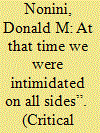

|
|
|
|
|
| Summary/Abstract |
This article proposes that the Emergency counterinsurgency campaign of the British colonial state should be viewed as a conjunctural episode of dispossession of Malayan laboring people. Conjunctural episodes of dispossession of working people through state violence and racialized rhetoric emerge as a response to crises in capitalist accumulation occurring at multiple and overlapping scales of capitalist systems – the imperial, the national/colonial, and the local/regional. During these episodes state and capitalist strategies destroy political organizations and solidarities among laboring people and demoralize them over long periods of time, through processes simultaneously material and semiotic. Employing new theorizations of the global anthropology of labor, this article first examines the postwar and Emergency years when the multiethnic and industry-wide bases of Malayan trade unions were destroyed while an estimated half a million working people were forcibly concentrated in so-called New Villages. This had the effect of suppressing a discourse of class and class struggle in favor of a dominant discourse of ethnic conflict. In an effort to articulate class struggle despite the presence of this dominant discourse of essential ethnic difference this essay examines the formation of a new working men's “society” in 1978–1980 and a dispute between truck drivers and truck owners in northern Malaysia.
|
|
|
|
|
|
|
|
|
|
|
|
|
|
|
|
| 2 |
ID:
140256


|
|
|
|
|
| Summary/Abstract |
Efforts to maintain a robust Singaporean economy have had to confront the serious challenge of substantial brain drain from the city-state. To address the negative effects of this problem, Singapore's ruling People's Action Party (PAP) has adopted a policy of increasing reliance on a foreign labor force. Meanwhile, the PAP appears to ignore the continued loss of human and intellectual capital. This study examines the main determinants of emigration from Singapore, specifically the political factors. The analysis is based on two primary data surveys that investigated what Singaporeans think about emigration: the 2006 Asian Barometer and the 2000–2002 Longitudinal Survey of Immigrants to Australia. Contrary to some previous empirical literature, data from these surveys indicate that anti–PAP and pro-democratic ideas strongly influence the decision of native Singaporeans to leave the island state. These findings likewise suggest that democratization and an expansion of business and technical education would be more effective in preserving economic growth than a policy of importing labor in the face of popular xenophobia.
|
|
|
|
|
|
|
|
|
|
|
|
|
|
|
|
| 3 |
ID:
140251
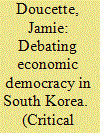

|
|
|
|
|
| Summary/Abstract |
In the 2012 Korean presidential election, both liberal and conservative parties fought their campaigns on the slogan of “economic democratization,” marking a strong departure from past presidential elections and the growth-first policies of the then-incumbent conservative administration. Both parties pledged to tackle growing social polarization and the concentration of economic power by reforming the corporate governance of Korea's large, family-led conglomerates (chaebol), to the degree that chaebol reform itself became synonymous with economic democratization. This focus led to a series of heated exchanges among liberal-left reformers about the vision of economic democratization being promoted, with one camp favoring the creation of a “fair market” through the restructuring of the chaebol and another promoting the protection of the chaebol’s management rights over their affiliates as a desirable strategy for the creation of a Korean welfare state. This essay examines the long-standing tensions between these two liberal-left perspectives and argues that the capital-centric and market-based visions these camps promoted risk confining intellectual debate over the meaning of economic democracy within boundaries that serve dominant political interests.
|
|
|
|
|
|
|
|
|
|
|
|
|
|
|
|
| 4 |
ID:
140254
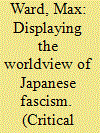

|
|
|
|
|
| Summary/Abstract |
This essay explores an imperial state exhibition held in Tokyo in 1938 and explains how the exhibition displayed a fascist worldview of historical crisis and national regeneration that was taking shape in Japan in the late 1930s. The exhibition – entitled the Thought War Exhibition (Shisōsen tenrankai) – was curated by the Japanese state's newly formed Cabinet Information Division (Naikaku jōhōbu) and held in Takashimaya Department Store in downtown Tokyo. Comprised of materials related to the Communist International, the Spanish Civil War, the national liberation struggle in China, and the communist and anticolonial movements inside the Japanese Empire, the Exhibition portrayed Japan's invasion of the Chinese mainland in 1937 as an extension of a global thought war against communism, requiring all imperial subjects to purify themselves of foreign influences and mobilize for national thought defense. While on the surface this Exhibition was an example of prewar state propaganda, it also expressed a fascist worldview that was coalescing in the Japanese state in the late 1930s. This essay investigates how this fascist worldview was exhibited in a sequence of displays, including dioramas, panoramas, illuminated maps, and display cases, and how these displays revealed constitutive contradictions that underwrote the formation of fascism in Japan.
|
|
|
|
|
|
|
|
|
|
|
|
|
|
|
|
| 5 |
ID:
140255
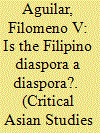

|
|
|
|
|
| Summary/Abstract |
Despite the widespread popularity of the discourse on diasporas since the 1980s, the recognition of a Filipino diaspora in the wider Anglophone scholarly world did not occur until the mid 2000s. A major factor for this recognition was the considerable number of scholarly works on Filipino Americans produced largely by Filipino American scholars who used diaspora as theoretical frame starting in the late 1990s. Grappling with the realities of the global migrations of Filipinos, the Philippine state and Filipinos in the Philippines and in other parts of the world also began to deploy the diaspora discourse. This article analyzes the ways in which the discursive fields in the US and in the Philippines have converged or diverged. Although diaspora can be a problematic concept, the author examines methodological issues that focus not so much on identities but on the imagined and constructed collectivity within which the putative diasporan identity of Filipinos is embedded. Without reducing diaspora to a reifying checklist, the author explores the Filipino diaspora discourse along these five dimensions: (a) population dispersal from an original homeland, real or imagined; (b) a process of diasporization; (c) ongoing relationship with the homeland, nurtured by collective memory or mythology; (d) idealization of return to the homeland; and (e) self-awareness or collective consciousness that is intergenerational and interrelated to coethnics and compatriots within the diaspora.
|
|
|
|
|
|
|
|
|
|
|
|
|
|
|
|
| 6 |
ID:
140250
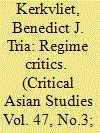

|
|
|
|
|
| Summary/Abstract |
Beginning in the mid 1990s, public criticism of the Communist Party government in Vietnam spread to the point that by 2014 it had become a prominent feature of the country's political scene. This article emphasizes critics who want to replace, nonviolently, the present regime with a democratic political system. Drawing primarily on the writings and actions of Vietnamese critics themselves, the analysis shows that they differ over how to displace the current system. Some regime critics think the Communist Party leadership itself can and should lead the way; others form organizations to openly and directly challenge the regime; still others urge remaking the current system by actively engaging it; and some favor expanding civil society in order to democratize the nation. Underlying the four approaches are different understandings of what democratization entails and how it relates to social and economic development.
|
|
|
|
|
|
|
|
|
|
|
|
|
|
|
|
|
|
|
|
|